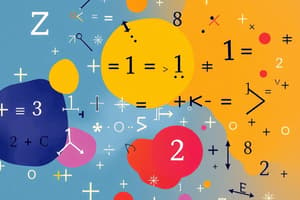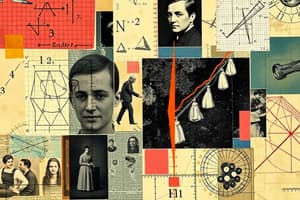Podcast
Questions and Answers
Which branch of mathematics is primarily concerned with shapes and sizes?
Which branch of mathematics is primarily concerned with shapes and sizes?
- Arithmetic
- Number Theory
- Algebra
- Geometry (correct)
Which property does NOT apply to basic arithmetic operations?
Which property does NOT apply to basic arithmetic operations?
- Differentiation property (correct)
- Associative property
- Commutative property
- Distributive property
What is the main focus of algebra?
What is the main focus of algebra?
- Studying shapes and sizes
- Solving equations and inequalities (correct)
- Analyzing the properties of whole numbers
- Calculating areas and volumes
Which of the following is a key concept in calculus?
Which of the following is a key concept in calculus?
What does number theory primarily investigate?
What does number theory primarily investigate?
Which application is NOT a direct use of mathematics in the STEM fields?
Which application is NOT a direct use of mathematics in the STEM fields?
What is a characteristic feature of algebraic equations?
What is a characteristic feature of algebraic equations?
Which concept is NOT typically associated with geometry?
Which concept is NOT typically associated with geometry?
Flashcards
Mathematics branches
Mathematics branches
Mathematics is divided into different areas like arithmetic, algebra, geometry, calculus, and number theory, each with its own focus.
Arithmetic operations
Arithmetic operations
Basic calculations like addition, subtraction, multiplication, and division.
Algebraic variables
Algebraic variables
Using letters to represent unknown values in equations.
Geometry shapes
Geometry shapes
Signup and view all the flashcards
Calculus rates of change
Calculus rates of change
Signup and view all the flashcards
Number Theory focus
Number Theory focus
Signup and view all the flashcards
Math Applications
Math Applications
Signup and view all the flashcards
Fundamental Math Concepts
Fundamental Math Concepts
Signup and view all the flashcards
Study Notes
Fundamental Concepts
- Mathematics is a system of logic, using symbols and rules to define quantities, structures, space, and change.
- It encompasses various branches, each with its own set of concepts and applications.
- Key branches include arithmetic, algebra, geometry, calculus, and number theory.
- Fundamental concepts like sets, numbers, functions, and operations form the basis of mathematical understanding.
Arithmetic
- Deals with basic operations on numbers, including addition, subtraction, multiplication, and division.
- Includes properties of numbers, such as commutative, associative, and distributive properties.
- Introduces different types of numbers like natural, whole, integers, rational, irrational, and real numbers.
- Covers algorithms for calculation and estimation.
Algebra
- Extends arithmetic by introducing variables to represent unknown quantities.
- Focuses on solving equations and inequalities.
- Includes topics like linear equations, quadratic equations, systems of equations, and polynomials.
- Uses variables to describe relationships amongst data, leading to equations and functions.
- Provides tools for logical reasoning and problem solving.
Geometry
- Studies shapes, sizes, and positions of figures in space.
- Includes concepts like points, lines, planes, angles, polygons, and circles.
- Covers various theorems and postulates related to geometric figures.
- Explores Euclidean and non-Euclidean geometries.
- Provides tools for visualization and spatial reasoning.
Calculus
- Deals with rates of change and accumulation of quantities.
- Includes differentiation and integration.
- Applied to problems involving motion, growth, and optimization.
- Used in various scientific disciplines, including physics, engineering, and economics.
- Provides methods for modeling continuous change.
Number Theory
- Focuses on the properties of whole numbers.
- Investigates concepts like prime numbers, divisibility, modular arithmetic, and Diophantine equations.
- Includes studies of perfect numbers and even and odd numbers.
- Deals with integer solutions to equations.
- Forms the basis of cryptography and other applications.
Applications of Mathematics
- Used extensively in various fields, such as science, technology, engineering, and mathematics (STEM).
- Plays a crucial role in modelling physical phenomena and solving real-world problems.
- Provides tools for data analysis, prediction, and decision-making.
- Essential for scientific discovery and technological advancement.
Studying That Suits You
Use AI to generate personalized quizzes and flashcards to suit your learning preferences.




